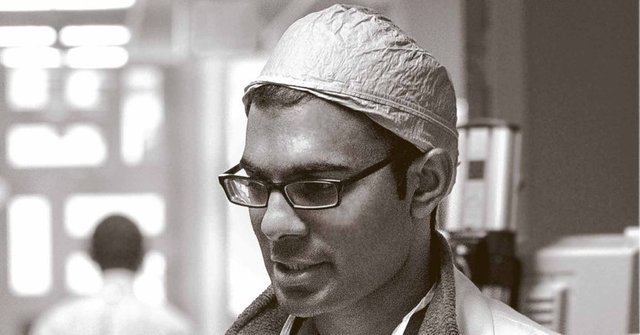review -- 'When Breath Becomes Air,' by Paul Kalanithi, neurosurgeon who died of lung cancer
I teach at the North Carolina Governor's School, where students with good grades spend six weeks on a college campus, learning without being graded. There are always a lot of wannabe doctors in the group, some of whom come from medical families, so they have some idea what's involved, and some of whom have only spent time in a hospital on House or Gray's Anatomy. I like to try and expose them to some of the real practice of medicine.
Last year we read some bits of Henry Marsh's Do No Harm, where – writing from retirement – he looked back on a 30-year career in neurosurgery. His book was a series of vignettes, based around operations as much as individual patients, heavier on technical detail and regret than most medical memoirs. Marsh went to some trouble to describe how it feels, in a tactile sense, to be poking around inside the braincase of a living (often awake) human being. During operations, he tugs on membranes, digs the sucker into soft tumors, clips aneurysms. Where Oliver Sacks had to empathize and imagine what it was like to be a person with neurological damage, Marsh was actually in there, looking at tissue, feeling it with his hands as well as his emotions, sometimes causing more damage than he repaired. He was aware of becoming more conservative surgically as he aged, less willing to tempt the gods of statistics to build his reputation. It was a good book for students, who are mostly a little cocky, as young people should be.

This year, I had just finished a review copy of Paul Kalanithi's memoir, written mostly during the last year of his life, after he had given up neurosurgery because he was too sick from the chemotherapy, just hoping to live long enough to see his daughter born. Paul did come from a medical family, but he started out as a philosopher and literature junkie, not a technician. He got into neuroscience partly for the same reasons I did, because science offered some hope of real progress on understanding those “eternal questions,” and partly because he was a compassionate person who wanted to help others. Clearly, he was also pretty driven by our cultural notions of material and social success. Medical school is a serious investment of time and resources, but neurosurgery adds a whole other decade to your training. Paul was thirty-five when he was diagnosed with lung cancer, and he still had over a year left on his residency! And once he started treatment, he went back to work, cutting on people! Who had cancer!
Oliver Sacks also wrote about being a patient (in A Leg to Stand On) and about his own death (in essays in the New Yorker and the New York Times). Sacks lived a long time, and died famous, but childless. Paul Kalanithi. died young, but surrounded by family, including his baby daughter, who was literally lying on his chest as he breathed his last. There's a temptation to compare, to try and find some kind of objective “pity-ometer.” To simplify. I am going to resist that temptation, and instead simply say that Kalanithi’s book is worth a few hours of your precious time on this planet.
REFERENCES
There are several magazine feature articles and at least two documentaries with Henry Marsh. Just search for him, or check his Wikipedia page.
Oliver Sacks wrote a number of books and articles.
Paul K's wife, also a doctor, talks about the book on NPR.
My book club will be reading this book for our January selection. Thanks for providing some information about it without spoiling the story.
You're quite welcome. Thanks for the comment.